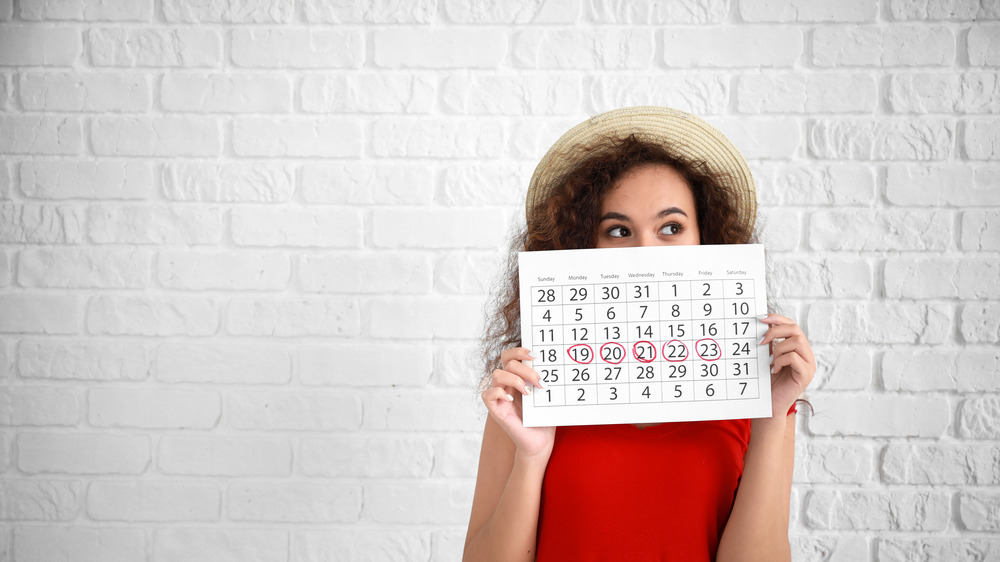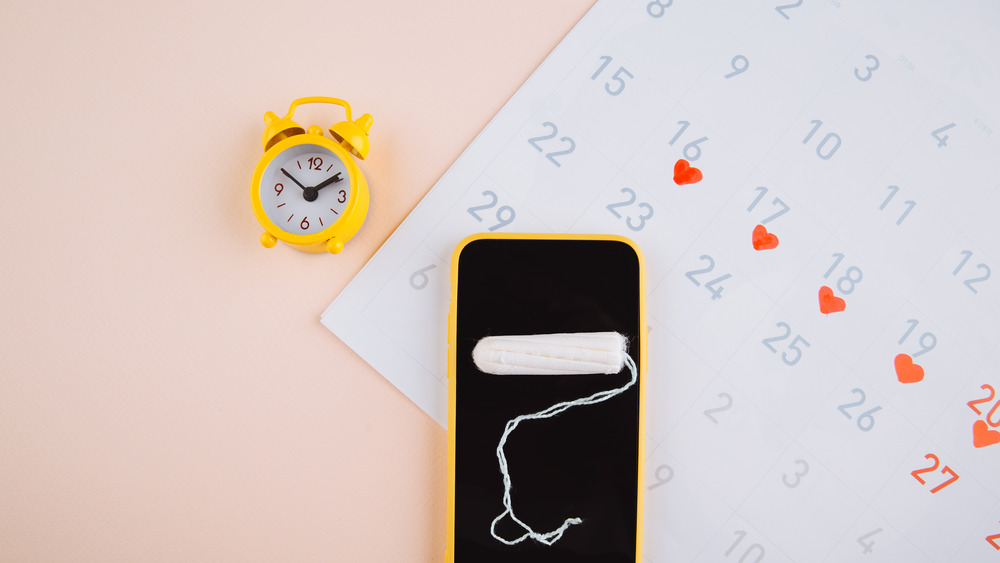Can You Really Sync Up Your Period With Someone Else?
Since 1971, when a study came out that examined the menstrual cycles of young women living together in a dormitory, it's been believed there's a phenomenon called "menstrual synchrony." Also known as period syncing, it's when young women living in close quarters get their period on the same day as each other. But despite the fact that the study was published in a prestigious journal called Nature, the theory of period syncing has been criticized ever since. Is it real? Is it true that periods start on the same day when women share a room or a close friendship?
While an undergraduate at Wellesley College, researcher Martha McClintock tracked the period start dates of 135 women living in a dormitory for six months. When the study started, there was an average difference of six and a half days between period start dates. By the end of the study, which was published in the journal Nature in 1971, McClintock found that the start dates averaged less than five days apart. She called this a "significant increase in synchronization" (per The Atlantic). The phenomenon of period syncing, also known as the McClintock Effect, caught fire and was not only cited in many other journals and academic publications, it also made its way into popular culture. To this day, it's mentioned on TV shows, and appears on listicles and in news stories.
If period syncing happens, what causes it?
Ever since the term "period syncing" entered the popular lexicon, theories have swirled about what causes it. One is that pheromones have something to do with it. Pheromones are chemical signals between animals that signify attraction and fertility, among other things, and attempt to influence hormonal behaviors in other same-species animals (per the Cleveland Clinic). It's certainly possible pheromones have the same effect in humans, but there's no research to support this theory. "Pheromones are largely emitted from the armpits and the groin, but think about the habits of modern-day society," Lynn Simpson, M.D., an OBGYN, told the Cleveland Clinic. "Maybe there's something there, but if you're washing it all off when you shower, the pheromones aren't going to have much effect."
But the question that comes up even more frequently than the cause of period syncing is, is it even real? Science is skeptical.
Is period syncing actually real?
Despite its popularity, critics found fault with McClintock's study based on its methodological problems, flaws in its period-syncing logic, and the fact that subsequent studies could not replicate its results. Researchers in China concluded in a 2006 study, that women living in groups did not synchronize cycles, and found in their review of a prior study that "group synchrony in that study was at the level of chance."
Data from period-tracking apps also debunk the McClintock Effect. A study published in 2017 from Oxford University and the period-tracking app Clue, looked at data from 360 pairs of women who had a close relationship and found that, over at least three menstrual cycles, 273 of the pairs had their cycles diverge and only 79 pairs had their cycles align. Living together didn't have an effect on cycle alignment (per Live Science).
The scientific consensus on period syncing is that it has to do with math and probability, not pheromones or other things. Beverly Strassmann, an anthropology professor at the University of Michigan, explained to The Atlantic that women have their periods at the same time as other women frequently, so it's easy to confuse menstrual overlap with menstrual synchrony. "A quarter of the time [two] women's menses should be overlapping, based on random chance," she said. The laws of probability say that if four women are living together, chances are at least two are going to have their period simultaneously.
Still, the belief continues
Despite the lack of studies supporting the McClintock effect, an adherence to period syncing still exists. In her 2016 study examining the reasons for the persistence of the belief in period syncing, Breanne Fahs, a woman- and gender-studies professor at Arizona State University, interviewed women about why they believed they had experienced period synchrony.
Among the reasons was that period synchrony provided a community among women. If everyone was suffering through painful and inconvenient periods at the same time, and simultaneously experiencing the anger that often accompanies menstruation, they also shared a feeling of empowerment. Fahs wrote in her study that one woman described this feeling as a "don't mess with us" solidarity.
So even though science says math and probability have to do with period syncing, not a mystical experience shared by women, it appears the myth is not going away. Some women may need it because it can often solidify bonding and close female relationships.




